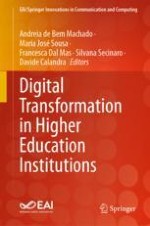2024 | OriginalPaper | Buchkapitel
Use of ChatGPT in Higher Education: A Study with Graduate Students
verfasst von : Rogério Costa, Adriana Lage Costa, Ana Amélia Carvalho
Erschienen in: Digital Transformation in Higher Education Institutions
Verlag: Springer Nature Switzerland
Aktivieren Sie unsere intelligente Suche, um passende Fachinhalte oder Patente zu finden.
Wählen Sie Textabschnitte aus um mit Künstlicher Intelligenz passenden Patente zu finden. powered by
Markieren Sie Textabschnitte, um KI-gestützt weitere passende Inhalte zu finden. powered by
